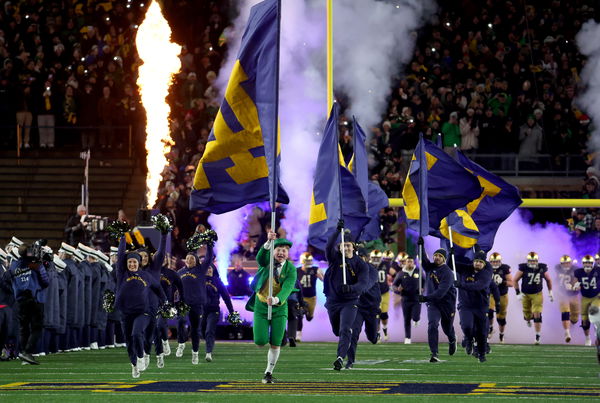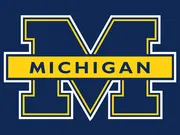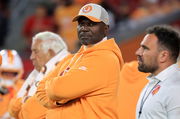
Imago
(EDITORS NOTE: caption correction) Jan 9, 2025; Miami, FL, USA; Notre Dame Fighting Irish head coach Marcus Freeman leads the team onto the field before the game against the Penn State Nittany Lions in the Orange Bowl at Hard Rock Stadium. Mandatory Credit: Nathan Ray Seebeck-Imagn Images

Imago
(EDITORS NOTE: caption correction) Jan 9, 2025; Miami, FL, USA; Notre Dame Fighting Irish head coach Marcus Freeman leads the team onto the field before the game against the Penn State Nittany Lions in the Orange Bowl at Hard Rock Stadium. Mandatory Credit: Nathan Ray Seebeck-Imagn Images
On January 20, 2025, the Notre Dame Fighting Irish will take on the Ohio State Buckeyes in the College Football Playoff National Championship game. This will mark the 16th and final game of the season for both teams. Ahead of the national title game, Notre Dame’s athletic director, Pete Bevacqua called the new 12-team playoff format a “wonderful success“. However, he also suggested that adjustments may be needed, particularly in how College Football Playoff byes are awarded in the future.
Watch What’s Trending Now!
Amid the ever-changing landscape of college football, Notre Dame comes from a long tradition of choices that set them apart. From their independence from the conference leagues or their famously imposed self-ban for 44 years on postseason play. This brings us to a key question: why did the Fighting Irish choose to step away from postseason play for so long? The decision wasn’t as simple as just saying ‘no thanks’ to bowl games. Let’s explore the reasons behind that decision and how it shaped the team’s path in the world of college football.
ADVERTISEMENT
What led to Notre Dame’s postseason absence?
The early years of bowl games saw them primarily as exhibitions, often tied to local festivals and tourism efforts. And if we consider the mid-1920s, the importance of national championships was not as prominent as it is today. Many institutions considered the extensive travel required for these games a significant burden and a potential disruption to the academic calendar, and Notre Dame always placed a huge emphasis on academics. The university back in those days was quite driven to provide a top-notch education, and travelling for bowl games would take players away from their studies for extended periods. One of the alumni, David Krishna from the class of 1971, noted in a letter, “My memory of the reason for the four-decade plus ban on bowl games was that University leaders felt that such participation would interfere with student final exams.”

Imago
Dec 20, 2024; Notre Dame, Indiana, USA; Cheerleaders for the Notre Dame Fighting Irish lead the team onto the field before a first round playoff game against the Indiana Hoosiers at Notre Dame Stadium. Mandatory Credit: Trevor Ruszkowski-Imagn Images
One other reason contributing to the hiatus was what could be called the fear of diminishing returns. In those years, there was a belief that a loss in a bowl game could overshadow the accomplishments of an otherwise successful season. Adding to this, in that era, there were polls determining a “mythical national champion” before bowl games were played and, at times, did not consider even the results of these games. Notre Dame was among those schools that considered this as a disruption to academics and the school’s image, hence refraining from the decision to participate in bowl games.
ADVERTISEMENT
Another driving factor was the perception that postseason games were geographically biased at the time. It was perceived that teams from the South and West were more favored, and Notre Dame, being a Midwestern institution, felt that the system was not entirely fair. There was also a concern about the increasing commercialization of college football, with bowl games becoming more about financial gain than the spirit of competition. Notre Dame, at the time, sought to maintain a more amateur and less commercialized approach to the sport. They wanted to chart their own course and not be dictated by the structures and expectations which existed at the time.
Top Stories
Forced to Leave FOX, Cowboys Legend Troy Aikman Says ESPN Is Like ‘U.S. Government’ & Clearly Distinguishes the Two Networks

Who Is Paige Shiver? All About Michigan Football Staffer & Daughter of Veteran Bears Scout Jeff Shiver

Charley Hull Opens Up on Traumatic Divorce from Ex-Husband for the First Time Ever

Cowboys Legend Troy Aikman Teases NFL Comeback After Airing FOX’s Dirty Laundry

Todd Bowles Points Fingers at Baker Mayfield & Co. in a Strong Statement That Could Get Him Punished After Bucs Loss

LIV Golf to Cut Ties With Veteran Pro After His PGA Tour Return Intentions Became Public

ADVERTISEMENT
Notre Dame’s return to the Bowl scene?
The 1925 Rose Bowl marked Notre Dame’s last bowl appearance, and the long absence of 44 years from bowl games became a tradition of sorts until the university accepted the invitation to the 1969 Cotton Bowl.
This marked a major shift for the program, and it was largely due to the influence of head coach Ara Parseghian, who convinced the university’s administration that it was time to bring the team back to the postseason. The Cotton Bowl game against Texas was a significant moment in Notre Dame’s history. Even though the ND lost to Texas, it marked the start of a new chapter, one where Notre Dame balanced its traditions with the evolving landscape of the sport.
ADVERTISEMENT
ADVERTISEMENT
ADVERTISEMENT

